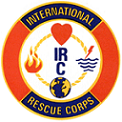Overview
The IRC is an independent (non-government-funded) United Nations-registered disaster rescue service with an accredited UK National Open College Network qualification in Urban Search and Rescue. As a charity, the IRC is supported entirely by donations from the public and sponsorship from industry. IRC members are unpaid volunteers and all services are provided free of charge –the organisation's sole aim is to save life. The IRC is named after the fictional emergency response organisation International Rescue in the Gerry Anderson TV series Thunderbirds . [13]
The IRC was formed in 1981 in the aftermath of the 1980 Irpinia earthquake and became operational in 1985. Since then, it has undertaken missions in the UK and around the world. [14] In many cases, missions are co-operative efforts working alongside other agencies both nationally and internationally. Overseas missions include several earthquakes, hurricanes and subsequent floods, mudslides and logistical or aid work, whilst UK missions include gas explosions, train crashes, highline rescues, missing person searches and floods.
Training and equipment
Originally, most IRC volunteers were emergency services personnel. Today, they include council workers, union representatives, management consultants, engineers and others.
To carry out the IRC's role, operational members are required to satisfactorily complete a three-year training programme through the UK National Open College Network. [15] Training consists of learning about earthquakes, specialist search-and-rescue equipment, building construction, medical aid and casualty handling, boat handling, advanced rope skills, orienteering and map reading, helicopter coordination, humanitarian logistics and communications. After the first year of training, members can perform supporting roles in local and national missions; only after the full three years (with assessments) can they take part in overseas operations.
Equipment taken by the team varies according to the nature of the disaster. Principal items include thermal imaging cameras, sound detectors, fibre-optic probes, portable generators and lights, cutting equipment, tents, 15 days' supply of food and water purification equipment, enabling the IRC to operate without drawing on the resources of the host country. Satellite communication systems enable the organisation to provide a reconnaissance and coordination service for the UN and other agencies if requested.
This page is based on this
Wikipedia article Text is available under the
CC BY-SA 4.0 license; additional terms may apply.
Images, videos and audio are available under their respective licenses.
